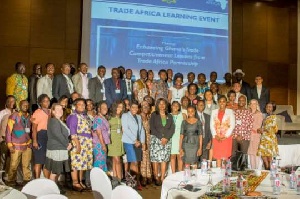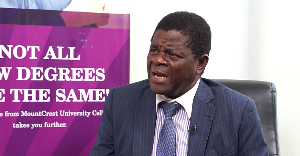Trade Africa, an initiative of the United States Government, since 2016, has provided $10 million to support Ghana’s World Trade Organisation (WTO) Trade Facilitation Agreement and improved phytosanitary standards.
It is also to help Ghana overcome technical barriers to trade, and support policies that promote regional trade and investments.
Mr Steven Hendrix, the Acting U.S. Agency for International Development (USAID) Mission Director, speaking at the Trade Africa learning event said fulfilling membership commitments to international organisations such as the WTO was an important component of integrating Ghanaian businesses into the global economy.
He said: “The US government is proud to support the Government of Ghana through increased exports of Ghanaian goods and businesses to the world markets.”
The learning event is on the theme: “Enhancing Ghana’s Trade Competitiveness Lesson from Trade Africa Partnership”.
The initiative announced, in July 2013, is to strengthen the US’ relationship with Africa and significantly expand US-African private and public sector collaboration to increase trade with and within Africa.
In 2013, the Trade Africa supported Burundi, Kenya, Rwanda, Tanzania and Uganda and in 2015, the initiative was expanded to include Cote d’Ivoire, Ghana, Mozambique, Senegal and Zambia.
He said: “We are working to make Ghanaian goods more competitive and increase opportunities for Ghanaian businesses to participate more fully in global value chains.
He said by boosting exports of Ghanaian products, the country could generate more revenue for itself, people could earn higher incomes from producing various goods, while it diversified the export base to high-value markets.
Mr Hendrix said under the Initiative, the United States had worked hand in hand with the Ghanaian Government to improve Ghana’s business environment, encourage open investment and boost trade.
By accessing diverse markets, Ghanaian firms could demonstrate their competitiveness and participate more fully in global supply chains, thus boosting the country’s GDP and providing incomes for millions of Ghanaians, he said.
He said helping businesses meet international standards so they could sell their products in high-value export markets was another way that the USAID, through Trade Africa, advanced shared goals of self-reliance.
“Broadening access to markets and helping firms seek new export markets is a pillar of USAID’s strategy to help Ghana move beyond foreign assistance to a relationship defined by trade,” he added.
Mr Carlos Ahenkorah, the Deputy Minister of Trade and Industry, expressed the Government’s gratitude to the US for extending the hand of partnership through the initiative that had come at an opportune time to enhance trade and economic engagements with the US.
He said the implementation of the initiative had been very beneficial to Ghanaians, especially in a number of critical areas, such as the implementation of the WTO Trade Facilitation Agreement.
He said the initiative also supported the Ministry of Trade’s work regarding the identification of Ghana’s category A, B, and C measures, which had been very important in fulfilling part of the commitments under the agreement.
He said there were other technical assistance programmes to the Ghana Revenue Authority’s -Customs Division.
These include improving the risk management framework to facilitate more targeted interventions for better operational efficiency.
Mr Ahenkorah said the initiative also provided institutional building capacities to enable local businesses to redress for unfair trade practices and this technical assistance had led to the establishment of the Ghana International Trade Commission, which was critical to enhancing private sector competitiveness and development.
He said the country lost $30 million in revenue over a three-year period due to the ban on vegetable exports to the EU market.
However, through the initiative, they stepped up to help the Ministry of Food and Agriculture’s Vegetable Export Task force.
They provided port cabins, equipment and food inspection technology at the airport so Ghanaian inspectors could assess vegetables before they were exported.
Business News of Friday, 26 October 2018
Source: ghananewsagency.org

















